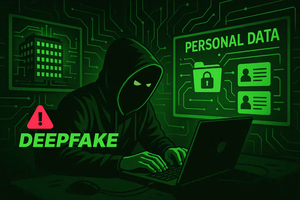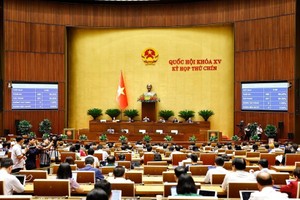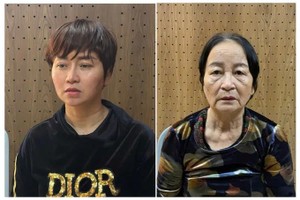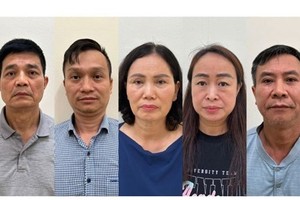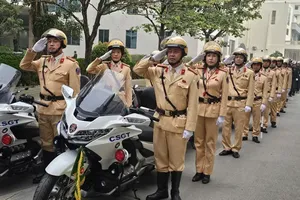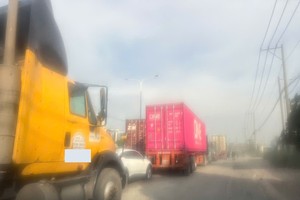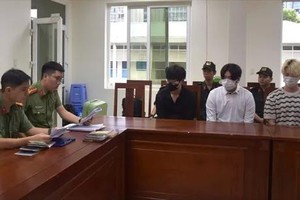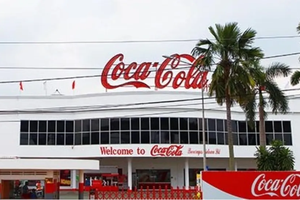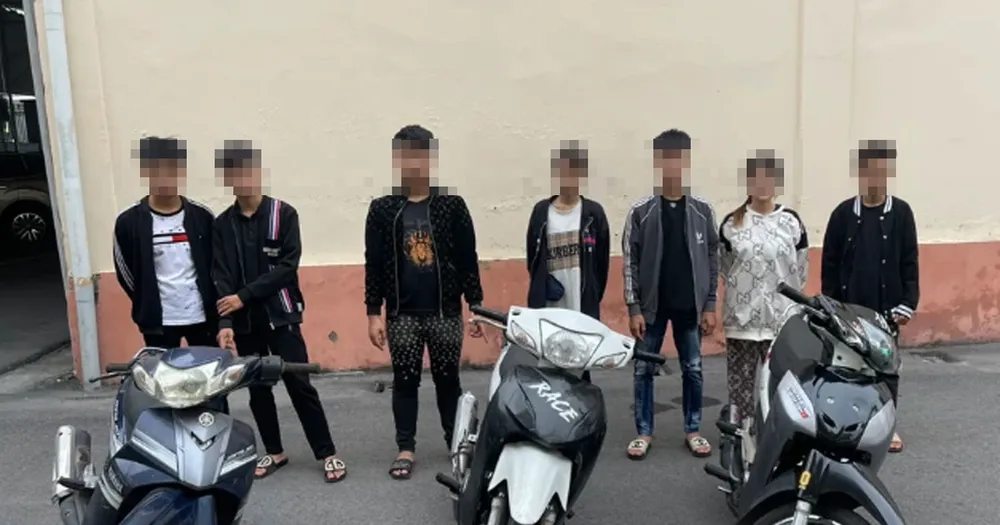
Recently, there have been many cases of juvenile crime in HCMC. A typical example is the arrest of a 4-member gang of property robbers in District 12, all aged 16-17, who had committed at least 7 robberies. This gang roamed around the districts of 6, 11, 12, and Tan Binh looking for unsuspecting victims to snatch their mobile phones and sell them for money. The criminals' behavior was reckless, disregarding the law and endangering people.
Another case is on May 4, when 17-year-old T.V.K. (residing in District 5) and 19-year-old Nguyen Khoa Minh (living in District 8) were arrested by Thu Duc City Police for investigation into extortion. These two often went to Sala City (An Loi Dong Ward, Thu Duc City) pretending to be police officers, with Minh wearing a jacket with the People's Police logo and carrying handcuffs, to stop vehicles without rearview mirrors or drivers not wearing helmets to extort money. They have been successful in 3 cases.
A more worrisome case is 7th grader T.N.K. From January to April 2024, K regularly beat and bullied his classmate D.V.H, asking the victim to pay him VND30,000 (US$1.18) each day. On April 29, K requested H to give him VND100,000 ($4) and a mobile phone. H then told his family, resulting in K caught red handed by this family for extortion. K was immediately handed over to the police.
According to Lieutenant Colonel Nguyen Thanh Hung, Head of the Criminal Police Division under the HCMC Public Security Department, juvenile crime has become growingly serious in the city. These teenage criminals normally belong to a gang, using dangerous self-made weapons to snatch others’ property and ready to resist law enforcement when discovered.
Adolescents are those in the process of physical, psychological, and personality development, and thus particularly vulnerable during legal proceedings. However, from initiation of prosecution, investigation, indictment, trial, and even during the execution of sentences, there is no distinction made between handling cases involving minors and those involving adults.
Statistics from the HCMC People's Court show that a high proportion of minors are subjected to pre-trial detention measures such as temporary detention or arrest. This can disrupt their education and living conditions and limit their contact with family. The high rates of pre-trial detention to this group can also influence sentencing decisions, leading to harsher punishments for minors.
Deputy Chief Judge Pham Thi Thu Ha of the HCMC People's Court stated that the draft Juvenile Justice Law aims to protect human rights, civil rights, the interests of the State and organizations, maintain social order, and protect the best interests of juveniles.
It ensures that the handling of juveniles is appropriate for their age, cognitive ability, personal characteristics, the social dangerousness of their offense, while still educating and assisting juveniles in correcting their mistakes, improving their behavior, and helping them become beneficial members of society.
“International practice and current regulations state that in essence, sending juveniles to correctional institutions is not a judicial measure but a punishment, meaning a form of restricting freedom and placing them in educational institutions with strict discipline in accordance with the law. Therefore, its application is not encouraged.
Instead, other handling measures should be applied as stipulated in the draft law, such as: apologizing to the victim; participating in education and vocational training programs; increasing curfew hours; asking them to join in community service; educating them at the commune/ward level; and having family supervision," suggested Ha.
The matter of reintegration for juveniles also has inadequacies despite a number of regulations about this. However, these regulation merely focus on the first stage of reintegration, the time before adolescent criminals are released from prison. Yet there is no specific regulations or programs to maintain the positive results of the first stage, when they actually come back and live among the community.
The implementation of support activities for juvenile offenders often relies heavily on campaigns and lacks a structured approach. In some cases, the efforts are limited to monthly reports on the offenders' legal compliance, without providing any further assistance. This lack of comprehensive support hinders the effectiveness of reintegration efforts, leaving these individuals vulnerable to falling back into criminal behavior.
From 2018-2023, the HCMC People's Courts at two levels handled and resolved 1,381 cases involving 2,079 juvenile defendants. The outcomes included:
- Imprisonment for 1,739 defendants
- Suspended sentences for 328 defendants
- Non-custodial rehabilitation for 12 defendants
- Application of judicial education measures at correctional schools for 2 defendants
